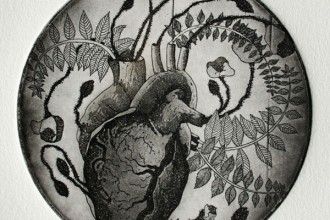“You,” he said, “are a terribly real thing in a terribly false world, and that, I believe, is why you are in so much pain.â€Â Emilie Autumn
By Maria Amir
IÂ am a writer who cannot write.
This is a hard admission to make considering the fact that words are pretty much my only currency and comfort in this world. It is words that have saved me time and again from both myself and my feelings by opening up a sidelong segue into a blind alley of thought. And yet, it appears that words are the very things that fail me now. I find myself cornered by people who can manage and manipulate words far more efficiently and proactively than I, rendering my efficacy rather redundant.
I am, however, rediscovering my relationship with words as I catch myself exploring newer kitsch schemes to motivate my students with their writing. I find myself writing under the influence quite often. Currently I am writing under the influence of oranges, post-run adrenaline rushes, Sunday morning sidewalks and lingering guilt. Such alchemy forms a jittery, jarring sort of high that is rather difficult to navigate with any sort of clarity.
I am living on a university campus again, though this time not as a student. This distinction is important, I find, because it is one I often need to remind myself of. I feel I am finally at a stage in my life where I could let myself succeed at something. Ironically, as it happens, being surrounded by perpetually positive and self-assured people is proving to be a good thing. I have often been told that, whereas most people suffer from high or low self-esteem, I suffer unequivocally from what can only be described as ‘no self esteem’. Often enough, I find it a gift. I used to think that it allowed me to take a microscope rather than a mere magnifying glass to things because I never feared the collapse of my own ego. Sadly, it also means that the things I am searching for seldom come to light. They live in a sad little laboratory, neatly labeled and bottled away from light, dust and… life.
The realization that I have been living most of my life on tomorrows and yesterdays is hankering. I suppose, in some way most people do this to some extent – live amid the flimsy glands of postponement and atonement. But I seem to have mastered it: my mind is riddled with masterful schemes and plans of my future. All doable ideas but irrevocably marked with one lowest common denominator: tomorrow. I can almost never meet deadlines unless they are work-related, and this is why my writing perpetually suffers. I can never consider it work, even though a part of me recognizes, as Cohen says, ‘that I needed to go to work at it everyday’.
Currently, I am enjoying the long-forgotten sensation of having a crush. It is rather refreshing because amid all my confusion and paranoia it has allowed me to construct a fantasy around someone else other than myself for a change. I enjoy crushes, mostly because I am acutely aware of their limitations. I never get involved and religiously avoid the subject of the crush because it destroys the illusion, which is the whole point of having a crush, really. I am spending a disproportionate amount of my evenings at the LUMS Jammin Java café reading David Foster Wallace and subtly spying on someone else reading something else. It is comfortable. I always maintain that the easiest way to cure a crush is to speak with the subject. The same is often true of relationships as well.
I suppose my downward spiral began three days after shifting to my new apartment. At the time, I was alone and neither of my flatmates had arrived. I was perfectly giddy about all my New Year changes, and suddenly one silly, Saturday evening, I found myself overestimating my ability to cope. I decided to Google my ex. Suffice it to say, that Googling your ex is always, always, always a bad idea. We all tend to operate on myths of closure, and then we construct waiting periods, coping periods, healing periods and getting-back-out-there periods purely because we need all experiences to be time-bound. This allows us a construct to move in and on from. In truth, there is no real science to moving on and how one does it, but I can unequivocally say that discovering how much better your former half is doing without you is not one of them. Even if the same is equally true for you.





